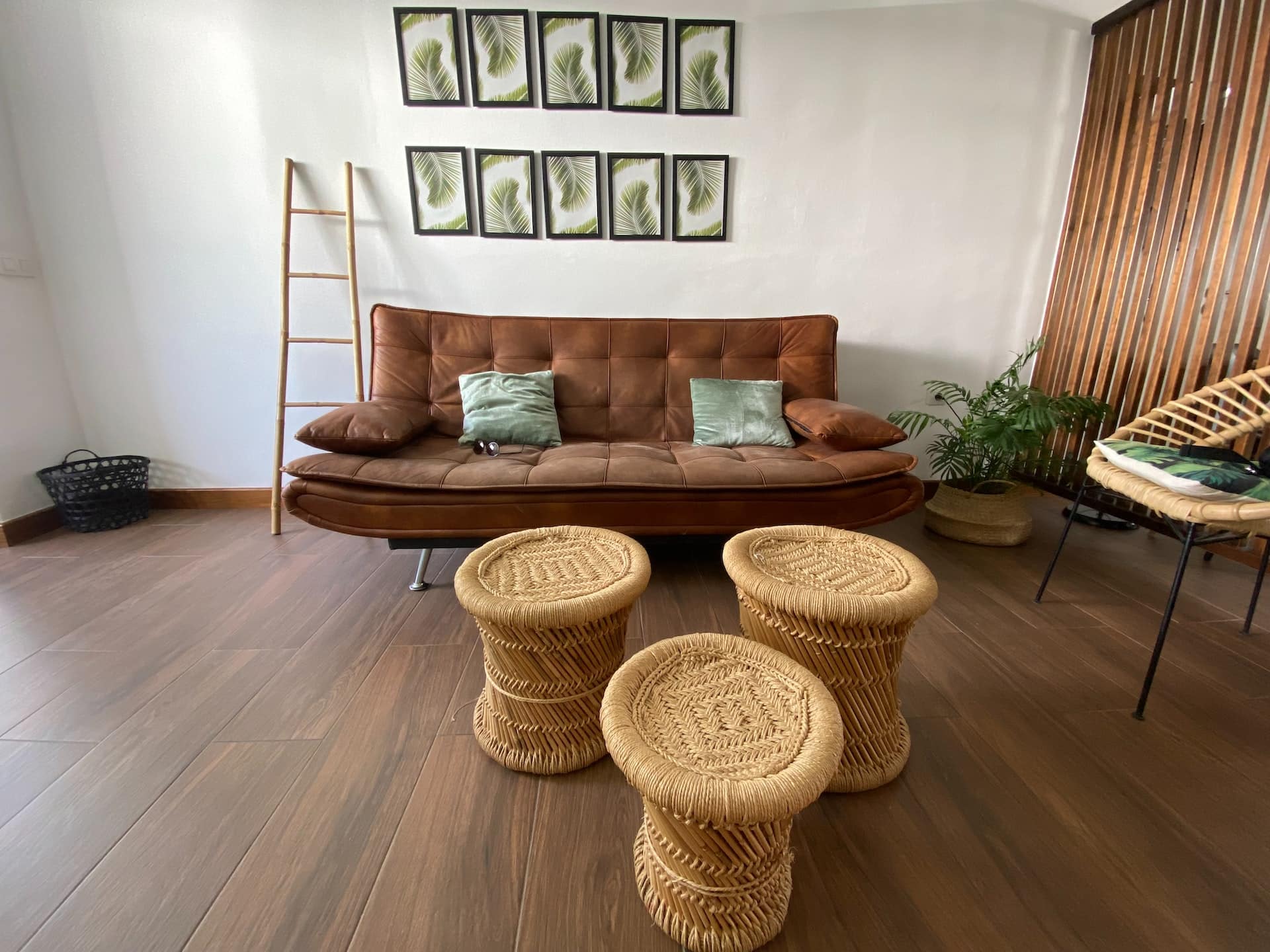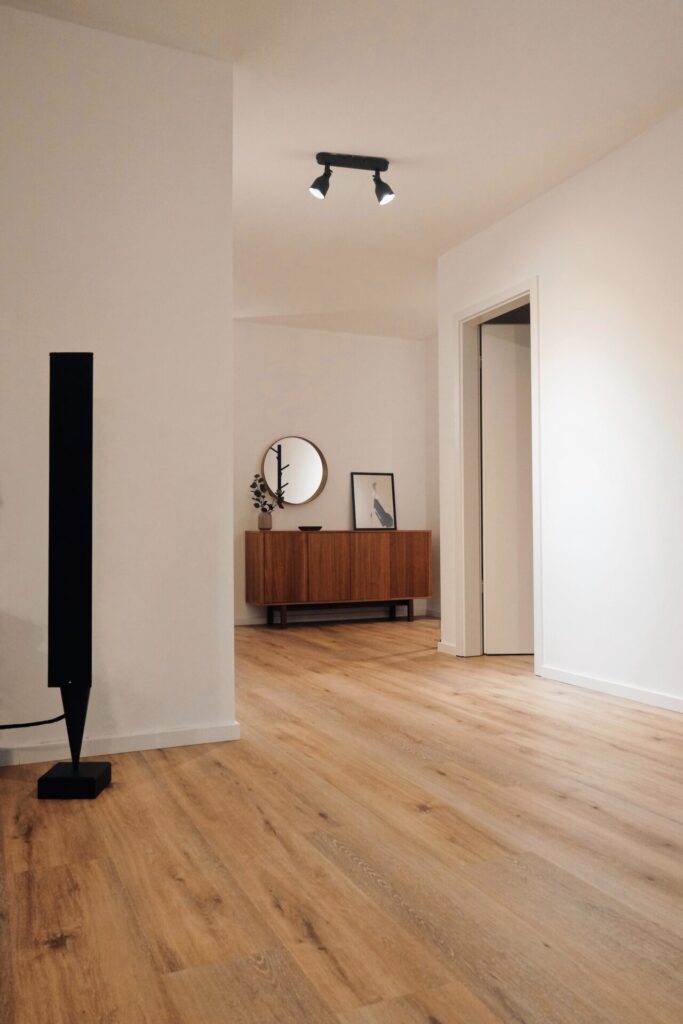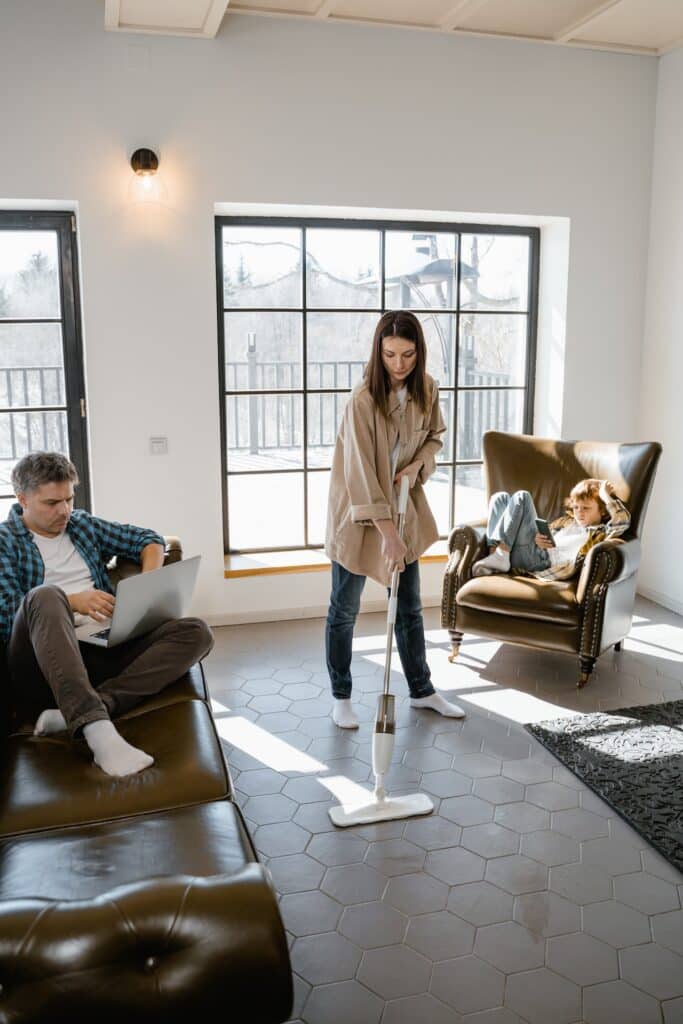
Vinyl flooring has continued to increase in popularity over the past few years, and for a good reason. Its versatile performance, durability and modern aesthetics have made luxury vinyl flooring one of the most sought-after floor coverings used both in residential and commercial spaces.
With its practical features, including dent and scratch resistance along with little maintenance, vinyl flooring has become a go-to option for many homeowners, especially active families and their busy households.
Some of the luxury types of this resilient covering make it particularly easy to deal with as they can handle typical spills and puddles. It often allows homeowners to have wood and stone designs in their kitchens and bathrooms, as certain varieties of vinyl flooring can be warranted as waterproof.
To better understand what makes vinyl flooring waterproof, we’ve prepared a handy guide in which we’ll talk about the characteristics of vinyl flooring, its composition, warranties and installation methods. Read on and learn about all the relevant factors which are responsible for the vinyl flooring’s waterproof properties.
What Is Luxury Vinyl Flooring?
Luxury vinyl is a specific type of vinyl flooring. Just like laminate flooring, vinyl is highly durable and stain-resistant. Both flooring options are often used as an alternative to more expensive flooring options, like hardwood. One of the significant advantages of vinyl is that it can handle topical moisture. As some of the luxury vinyl flooring types are warranted waterproof, this flooring option is perfect for such household settings as bathrooms, kitchens or basements.
Old-school vinyl flooring used to be available in sheet form only and therefore wasn’t able to replicate the realistic natural materials that luxury vinyl floors can mimic these days. Modern vinyl flooring designs are now offered in countless patterns and colours so that they look almost identical to such materials as wood, stone, and tile. Many types of luxury vinyl flooring options are textured to give an even more realistic look of the natural materials.
Types of Luxury Vinyl Flooring
If you’re considering installing vinyl flooring in your home, there are several types of luxury vinyl flooring that you can choose from depending on your needs and preferences, as well as where you would like to install your flooring.
When shopping for luxury vinyl flooring, you can typically find three basic types of it: plank, tile, and sheet.
- Luxury vinyl planks – these are the most popular variety of luxury vinyl flooring, which are designed to replicate hardwood floors as the planks offer the look of cut hardwood.
- Luxury vinyl tiles – they are often used to mimic stone and create unique, stylish patterns.
- Luxury vinyl sheets – they come in 6 and 12 feet lengths, making for very few (if any) seams when installed, which is one of the reasons why they are installed in large commercial areas. They can also mimic the look of hardwood, stone, and tile with intricate patterns to choose from.
Waterproof vs. Water-Resistant – What’s the Difference?

Vinyl flooring is known for its great moisture protection, which is higher than other common hard surface options. For that reason, many homeowners choose this type of flooring for bathrooms, kitchens or basements when they want to give the spaces a stylish look while maintaining safe conditions.
Very often, homeowners come across “waterproof vinyl plank flooring” and “water-resistant vinyl plank flooring” when shopping for floor covering. While both types serve as a moisture protection solution, they are slightly different from each other, and it’s crucial to know the difference between them before purchasing and installing them.
Water-resistant indicates that the vinyl floor covering can withstand the common topical spills, pet mishaps or light moisture caused by rainy weather conditions. You won’t risk exposing your floors to damage as long as you wipe the spills quickly. It’s important to remember that water-resistant vinyl flooring cannot hold up to long-standing spills associated with plumbing leaks, an overflowing bath or flooded spaces.
On the other hand, waterproof vinyl flooring is resistant to topical spills and common household moisture thanks to its impenetrable surface and material. Waterproof vinyl planks can also be installed with a 2-part adhesive, which makes them handle standing water well without being compromised.
How Is Waterproof Vinyl Flooring Constructed?
What makes vinyl plank flooring waterproof or resistant to water lies in its core materials. Premium vinyl flooring is normally constructed from four layers of material. If you’re looking for a fully waterproof floor, you should opt for rigid core flooring, which is an SPC or WPC product. Many of those contain an attached underlayment that offers great sound insulation, improved comfort, and antimicrobial protection. It also allows for installing underfloor heating systems.
What Is Rigid Core Flooring?
One of the main features of rigid core flooring products is their enhanced durability which makes them a long-lasting flooring material. While standard vinyl flooring is thin and flexible, the rigid core alternative is thicker and sturdier, allowing homeowners to enjoy its innovative design with unique practical advantages.
Rigid core flooring products are available in both plank and tile shapes which open an array of design possibilities while standing up to a lot of foot traffic and, of course, water and moisture.
Another excellent advantage of rigid core flooring that makes it perfect for busy households is that it can handle subfloor imperfections. Besides, it offers great sound insulation and high-quality comfort underfoot, which enhances the overall user experience.
If you’re considering installing rigid-core vinyl planks, it’s crucial that you explore the differences between WPC and SPC floorings to pick the most suitable floor covering for you.
WPC Flooring
Wood plastic composite flooring, also known as WPC, is a type of vinyl plank flooring with a rigid core that can be made from recycled wood pulp and plastic or polymer composites expanded with air. Thanks to this unique combination of wood pulp and plasticisers, the WPC cores are fully waterproof.
The lightweight WPC planks, also referred to as “wood polymer composite flooring”, and feature a low-density construction that feels warm and soft underfoot, providing greater comfort. These vinyl planks are installed with a locking system without the need to use adhesives, which accounts for better durability. What’s most important, the material isn’t prone to swelling in the case of accidental spills even if they remain on the floor for long periods of time.
SPC Flooring
Stone plastic composite flooring, also referred to as SPC, is another type of vinyl plank flooring featuring a rigid core. The core is made from powdered limestone, polyvinyl chloride, and stabilisers. Also known as “stone polymer composite flooring” or “solid polymer core”, SPC vinyl floor planks are dense, strong and dimensionally stable. They are designed to be completely waterproof and resistant to any type of topical moisture and humidity, which never cause the planks to swell. Many SPC planks also feature an attached pad that enhances comfort and provides greater performance benefits.
WPC vs. SPC – Which One to Choose?
Both WPC and SPC vinyl floor planks are highly durable and water-resistant. No matter which type of those vinyl planks you choose, you can be sure your floors will handle high traffic, scratches and the busy everyday life of your household in general.
Still, there is one difference between WPC and SPC, and it’s related to the rigid core density. To put it simply, the stone is denser than wood, therefore, SPC vinyl planks will resist heavy impact more than the WPC alternative. On the other hand, WPC provides more give.
When shopping for waterproof vinyl flooring, think about where you plan to put your new flooring first. Selecting the correct construction of your vinyl planks will make a significant difference to your overall experience. As SPC construction offers greater stability due to its higher density, it is often chosen for commercial areas where the traffic is very high.
When choosing vinyl flooring for commercial settings, its durability plays an equally important role as its waterproof properties. Normally, the thicker the wear layer of a vinyl plank is, the more durable the flooring will be.
To handle high commercial traffic and regular cleaning, your waterproof vinyl flooring should have a minimum of wear layer thickness of 20 millimetres. For even better protection, it is recommended to purchase vinyl planks that are upgraded to a high-quality polyurethane wear layer with aluminium oxide or ceramic bead technology. It will provide better durability in commercial spaces, as well as preserve an overall better appearance over time.
Importance of Waterproof Vinyl Plank Flooring Warranty
Despite your vinyl planks may be warranted as “waterproof”, the definition of this term may often vary depending on the manufacturer. Therefore, it’s crucial to review the warranty of your selected products before purchasing and installing them.
For example, some manufacturers require to use a subfloor moisture barrier when addressing moisture issues before installation in order for the waterproof vinyl flooring warranty to be valid.
Normally, the validity of any waterproof warranty depends on following the manufacturer’s specific installation instructions. A waterproof vinyl flooring warranty will guarantee that your flooring will stay in good condition and will not discolour, damage, swell or lose integrity from topical moisture or water spills. However, those claims relate to the vinyl floor product itself and do not cover damage to the subfloor, adhesives, and surrounding floor structure.
To ensure the validity of your waterproof vinyl flooring warranty, it’s essential that you review the documentation thoroughly before purchasing and installing your vinyl floor planks.
How to Maintain Vinyl Plank Flooring?

Although your vinyl flooring offers better moisture retention, it’s still important to establish an appropriate care routine for your vinyl planks. Both waterproof and water-resistant planks are easy to maintain, and regular sweeping, dust-mopping, or occasional spot treatment with gentle cleaner can keep the floors in good condition.
However, if you’re looking for a quick and easy way to deep clean your vinyl flooring, you need to make sure your waterproof vinyl planks are warranted for wet mopping and can resist heavy splashes that can often come with it. In many cases, wet mopping can void the warranty of your floor planks and cause structural damage if the flooring isn’t approved for such a cleaning method.
Generally, if you want to make your vinyl flooring last longer and keep its visual features in good condition, you must ensure never to let any liquids pool or collect on your floors and in case of any contact with moisture, you should dry the floors as soon as possible.
The Bottom Line
Vinyl flooring is one of the most popular floors covering options used in both household and commercial settings. Its stylish wood- or stone-like design mixed with enhanced durability and water-resistant properties often serve as a great alternative to, for example, hardwood flooring, as it can handle high traffic and topical moisture.
Some luxury vinyl floor planks feature a high-quality multi-layered construction which makes them completely waterproof, allowing for safe installation in such settings as bathrooms or kitchens.
If you’re looking for a stylish yet practical flooring option, luxury vinyl flooring is your best choice. Luxury vinyl comes in a variety of styles, so you can choose whatever style you like for your home while enjoying your floors’ incredible performance in any conditions.
If you’re ready to transform your home into a stylish yet functional place, contact us to get an instant quote on your ideal luxury vinyl flooring.
